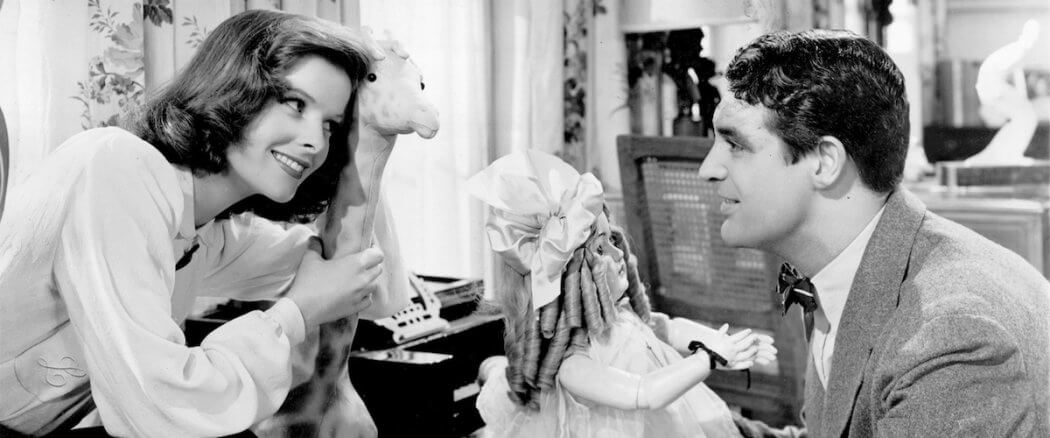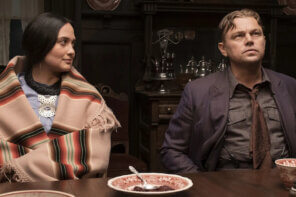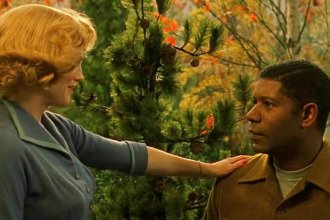In the 15 minutes of Googling I did about home renovation, the best advice I found was from Steve Watson. “You bought [your home] for a reason, because you liked that style. So keep your new design, your new build projects within that style.”
It’s the right metaphor with which to begin my review, considering I don’t own a house, nor do I intend to, and Holiday itself is critical of the American qualifications for a home. In adapting Philip Barry’s play for the screen, Donald Ogden Stewart knew the style in his bones; he was in the original Broadway cast and a friend of the playwright. The renovation of Holiday is one of the most deft and bold I’ve seen of any play, respecting the source while refusing to be respectable about it. Of course, Stewart had incredible comrades in his stars, Katharine Hepburn and Cary Grant, and his director, George Cukor, who were all acquainted with respectability.
Joyfully Defiant
Johnny Case (Cary Grant) has been working since he was 10. “I want to find out why I’m working,” he philosophizes, “it can’t just be to pay bills and pile up more money…There are a lot of new, exciting ideas running around. Some may be right and some may be cockeyed but they’re affecting all our lives. I want to know…what it’s all gonna mean to me. I can’t find that out sitting behind some desk in an office, so as soon as I get enough money together, I’m going to knock off for a while.” When Johnny meets and becomes engaged to Julia Seton (Doris Nolan) on holiday, he assumes she will fold up in his map and they will travel the world together. That is, until he visits her house and meets her family.
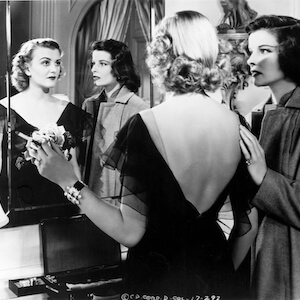 Julia is a member of “those Setons,” a banking dynasty in New York. Edward Seton (Henry Kolker), Julia’s father, is the patriarch, with all of the denotive and connotative meaning of that word. Edward’s other children, Linda (Katharine Hepburn) and Ned Jr. (Lew Ayres) try and fail to resist him, coping through nostalgia and alcohol, respectively. Linda cannot connect her past to her present, held by the memory of a mother who, by all accounts, strove to disentangle her husband and protect her children from the strangling roots that are the love of money. Every attempt by Linda and Ned Jr. to vacate the house and declare a vocation have been crushed by their father. The only difference between them, as Ned Jr. explains it, is that “Linda always hopes.” In contrast, Julia is daddy’s girl — and the two of them have plans for Johnny, without hope or a future. Just “a reverence for riches.”
Julia is a member of “those Setons,” a banking dynasty in New York. Edward Seton (Henry Kolker), Julia’s father, is the patriarch, with all of the denotive and connotative meaning of that word. Edward’s other children, Linda (Katharine Hepburn) and Ned Jr. (Lew Ayres) try and fail to resist him, coping through nostalgia and alcohol, respectively. Linda cannot connect her past to her present, held by the memory of a mother who, by all accounts, strove to disentangle her husband and protect her children from the strangling roots that are the love of money. Every attempt by Linda and Ned Jr. to vacate the house and declare a vocation have been crushed by their father. The only difference between them, as Ned Jr. explains it, is that “Linda always hopes.” In contrast, Julia is daddy’s girl — and the two of them have plans for Johnny, without hope or a future. Just “a reverence for riches.”
That reverence crosses and uncrosses itself throughout another Barry/Stewart/Cukor collaboration, The Philadelphia Story, adapted for film two years after Holiday. In a conversation with Cukor, an interviewer commented that Barry “really seems to think the rich are the most marvelous people on earth.” Cukor replied, “Maybe so do I — let’s face it. Do you?” It’s more complicated than that, though, as elsewhere in the same interview, Cukor claimed he and Barry “[made] fun of the rich.”* In The Philadelphia Story, ultimately, the status quo is stabilized; in Holiday, there is a subversion so joyfully defiant that it inspires.
Marxist Gospel
“[During the late twenties, Stewart had been ‘in Society,’ as he liked to say,” writes Barbara Leaming, “[but] the Depression made him a proponent of the Marxist gospel. He slipped some of his newfound political views into the screenplay [of Holiday], probably in hopes of giving Johnny Case’s revolt a timely significance. Still, Philip Barry’s message that we must take time off from work to experience life seemed naive and irrelevant in Depression America, when people were eager for any work at all.”** Amongst this simplistic summary of the script and box office sales, there might be substance to Leaming’s speculation for a reason she doesn’t identify — the film threatens America as Christian empire. That may sound like an anachronistic assignment of intent, but it is in the script, and Stewart put it there. A breathtaking moment near the end serves as confirmation:
EDWARD: I consider [Johnny’s] whole attitude un-American.
LINDA: Oh, are you serious?
EDWARD: Entirely.
LINDA: Well, then he is, and he won’t go to heaven when he dies, because apparently, he can’t quite believe that a life devoted to piling up money is all it’s cracked up to be. Strange, isn’t it, when he has us right before his eyes for such a shining example?
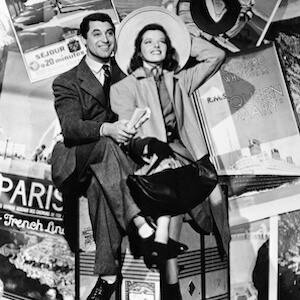 Some of this is in Barry’s play, a commentary manifesting as “throwaway candor.”*** But Stewart added the bit about heaven, and his script is on a mission from the start, with its introduction to the characters. Rather than using Barry’s beginning, which focuses on Johnny and Julia’s coupledom, Stewart shows Johnny rushing to share the engagement news with his friends, Nick and Susan Potter (Edward Everett Horton and Jean Dixon). Their marriage does not exclude, as the institution so often does; we learn the Potters and Johnny lived together at one point. It’s a rejection of the nuclear family, a household open to others, offering instead of hoarding. All three actors depict this little community so naturally, so brilliantly, so winningly, that you want to be with them. It’s a tribute to the performers and Cukor’s direction of them.****
Some of this is in Barry’s play, a commentary manifesting as “throwaway candor.”*** But Stewart added the bit about heaven, and his script is on a mission from the start, with its introduction to the characters. Rather than using Barry’s beginning, which focuses on Johnny and Julia’s coupledom, Stewart shows Johnny rushing to share the engagement news with his friends, Nick and Susan Potter (Edward Everett Horton and Jean Dixon). Their marriage does not exclude, as the institution so often does; we learn the Potters and Johnny lived together at one point. It’s a rejection of the nuclear family, a household open to others, offering instead of hoarding. All three actors depict this little community so naturally, so brilliantly, so winningly, that you want to be with them. It’s a tribute to the performers and Cukor’s direction of them.****
A Hellish Landscape
The entire movie, Stewart continues pulling wrenches from his toolbox, throwing them in wherever there’s an opening. One of the biggest wrenches is a scene Stewart added, and it tightens your stomach. Julia seeks approval of her engagement from Edward, but the performances of Doris Nolan and Henry Kolker mold it into a negotiation, which reaches a crescendo as Edward lights his cigar and delivers a monologue:
You see that cigar?…That’s a brand of cigar I’ve smoked for 35 years. Your grandfather smoked the same brand. I know the quality of the tobacco in it because I happen to own the plantation where it was grown. And I know therefore that when I light it, it will burn smoothly and pleasantly, and I know above everything else that it will never explode in my face…It’s a strange new spirit at work in the world today. A spirit of revolt. I don’t understand it and I don’t like it.
With eager assurance, Nolan replies that “[Johnny will] burn, father, calmly, steadily, pleasantly.” She’s wearing a luxury pajama set, gleaming in the light. It’s one of many clever costume choices by Robert Kalloch that signal a character’s objectives, principles, and tactics before they even say a line. Moments later, Linda pops in the room to check on Julia’s campaign to receive Edward’s blessing of the marriage, which has been successful. Linda’s excitement and embraces — partly about Julia, but mostly about the idea of escape — are met by Edward with a patronizing “be careful, daughter, you’ll put out my cigar.” In rapid and deliberate strokes, Stewart’s dialogue paints a hellish landscape of generational, systemic, and personal sin; the lure of wealth and the legacy of oppression. And it’s not an abstract painting.
The Playroom
Hepburn’s performance as Linda in the above scene is representative of her work in Holiday — the pure hysterical high of a person accessing most of her feelings, desires, and body through the life of her sister and a relationship she can’t have — a sublimation with such catharsis, she doesn’t question it. Hepburn acts all of this so quickly, delicately and nimbly, it’s like watch repair; a miracle of tender skill. I cried.
Have I mentioned that Linda and Johnny fall in love? No, I haven’t, because you already knew. Hepburn and Grant were unmatched performers and queer ducks who swam upstream. They did a string of iconic movies together, joining forces in a way that didn’t happen opposite other costars. “With [Spencer] Tracy and Hepburn, it was ‘5-oh, 5-oh,’” explains Patrick McGilligan. “With [Grant] and Hepburn, it was more a game of dare and double dare.”***** With George Cukor — euphemized as a “Woman’s Director”— working alongside them, it was triple dog dare.
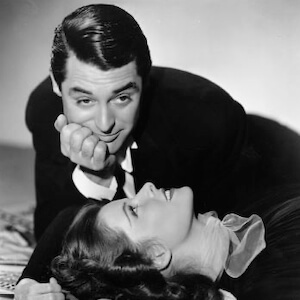 The gift exchange between this queer trinity and Stewart make Holiday “[an attempt] to define a heterosexual relationship which is actually in line with the tendency of the persona rather than a check on it.”****** In other words, Hepburn and Grant were a bisexual clown couple and Cukor and Stewart pitched a big top. That’s not a metaphor — the clowning is truly first rate — and Holiday is full of literal acrobatics, no doubt informed by Grant’s first career in the performing arts, the circus.
The gift exchange between this queer trinity and Stewart make Holiday “[an attempt] to define a heterosexual relationship which is actually in line with the tendency of the persona rather than a check on it.”****** In other words, Hepburn and Grant were a bisexual clown couple and Cukor and Stewart pitched a big top. That’s not a metaphor — the clowning is truly first rate — and Holiday is full of literal acrobatics, no doubt informed by Grant’s first career in the performing arts, the circus.
There is a trapeze mentioned in Barry’s Holiday, though, in “the playroom.” That brings us to mother, only mentioned once in my review but the spirit of Holiday. “Were the logic of Linda’s character to be fully realised,” writes Andrew Britton, “she would be bisexual — and Holiday can’t do that. It can, however — and it’s enormously to its credit that it does — construct a female character whose strength is not a matter of her ‘masculinization’ and whose heterosexuality is defined by an identification with her mother, not as ‘wife,’ but — with a radical explicitness — as a woman in opposition.”******* This opposition is what defines Holiday. It refuses to accept the current form, or reform. It dares to imagine something more.
__________________________________________
*Both of these quotes are from On Cukor, Gavin Lambert, G.P. Putnam’s Sons, 1972.
**Katharine Hepburn, Barbara Leaming, Crown Publishers Inc., 1995.
***Cukor, Lambert.
****“[Cukor] is seldom listed with the so-called great directors…I think that I have finally figured out why,” writes Katharine Hepburn in Me: Stories From My Life, published by Ballantine Books in 1991. “He was primarily an actor’s director. He was primarily interested in making the actor shine. He saw the story through the eyes of the leading characters.”
*****George Cukor: A Double Life, Patrick McGilligan, St. Martin’s Press, 1991.
******Katharine Hepburn: Star as Feminist, Andrew Britton, Columbia University Press, 1984.
*******Hepburn, Britton.

